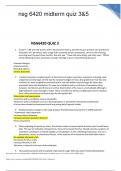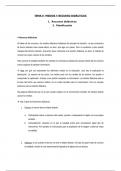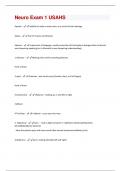QUESTION 1
A.
In Mubilanzila Mayeka and Kaniki Mitunga vs Belgium the European Court on Human Rights
(ECtHR) concludes that the Belgian state has violated its positive obligation under Article 3 of
the European Convention on Human Rights (ECHR) as regards Tabitha’s detention. Explain
how the Court arrived at that conclusion. In your explanation, discuss at least three different
arguments that the ECtHR uses and refer to specific paragraphs of the judgment (+/- 250
words) (6 points).
Tabitha is the second applicant in this case. The applicants complained that Tabitha had
been detained in violation of Article 3 of the Convention. Article 3 leaves no room for
exceptions, it’s an absolute right. Article 3 is one of the fundamental values of the
democratic societies making up the Council of Europe (Soering v. the United Kingdom).
In this case, the Court ruled that there was indeed a violation under Article 3 ECHR by the
Belgian state which had violated its positive obligation (§59). Tabitha was only five years old
when she was detained by the Belgian state. Furthermore, she was unaccompanied by her
family resulting in her being left to her own devices and she was an illegal immigrant in a
foreign country. This concludes that Tabitha was in ‘’an extremely vulnerable situation’’ as
the Court states (§55). In view of Article 3 ECHR, which bears an absolute nature of
protection, the Belgian State owed a duty towards highly vulnerable members like Tabitha to
provide care and protection in light of its positive obligations under Article 3 ECHR.
§52 also states that the measures which were taken by the Belgian state towards Tabtiha
such as daily phone calls with her mother and uncle and the help of the staff where not
sufficient enough to meet all the needs for a five-year-old child. The Belgian State did not
meet the criteria of care and protection in light of its positive obligations under Article 3
ECHR.
The chamber du conseil ruled that the detention of Tabitha was unlawful under the
Convention on the Rights of the Child and ordered her immediate release. Regarding the
detention, Tabitha’s lawyer referred the matter to the Aliens Office discussing the
consequences of the detention regarding to her mental state. This concludes that the
Belgian State was more than once informed about Tabitha’s detention, but they failed to
take action to avoid the shortcomings (§57).
A.
In Mubilanzila Mayeka and Kaniki Mitunga vs Belgium the European Court on Human Rights
(ECtHR) concludes that the Belgian state has violated its positive obligation under Article 3 of
the European Convention on Human Rights (ECHR) as regards Tabitha’s detention. Explain
how the Court arrived at that conclusion. In your explanation, discuss at least three different
arguments that the ECtHR uses and refer to specific paragraphs of the judgment (+/- 250
words) (6 points).
Tabitha is the second applicant in this case. The applicants complained that Tabitha had
been detained in violation of Article 3 of the Convention. Article 3 leaves no room for
exceptions, it’s an absolute right. Article 3 is one of the fundamental values of the
democratic societies making up the Council of Europe (Soering v. the United Kingdom).
In this case, the Court ruled that there was indeed a violation under Article 3 ECHR by the
Belgian state which had violated its positive obligation (§59). Tabitha was only five years old
when she was detained by the Belgian state. Furthermore, she was unaccompanied by her
family resulting in her being left to her own devices and she was an illegal immigrant in a
foreign country. This concludes that Tabitha was in ‘’an extremely vulnerable situation’’ as
the Court states (§55). In view of Article 3 ECHR, which bears an absolute nature of
protection, the Belgian State owed a duty towards highly vulnerable members like Tabitha to
provide care and protection in light of its positive obligations under Article 3 ECHR.
§52 also states that the measures which were taken by the Belgian state towards Tabtiha
such as daily phone calls with her mother and uncle and the help of the staff where not
sufficient enough to meet all the needs for a five-year-old child. The Belgian State did not
meet the criteria of care and protection in light of its positive obligations under Article 3
ECHR.
The chamber du conseil ruled that the detention of Tabitha was unlawful under the
Convention on the Rights of the Child and ordered her immediate release. Regarding the
detention, Tabitha’s lawyer referred the matter to the Aliens Office discussing the
consequences of the detention regarding to her mental state. This concludes that the
Belgian State was more than once informed about Tabitha’s detention, but they failed to
take action to avoid the shortcomings (§57).










